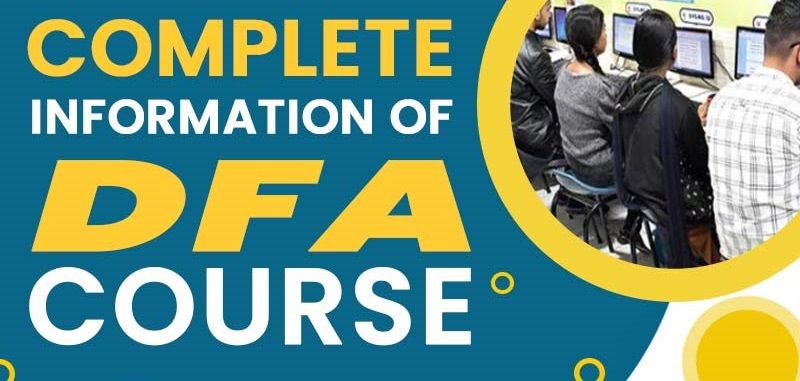Syllabus for the Diploma in Financial Accounting (DFA) Course at Future Byte Institute Landhora
The Diploma in Financial Accounting (DFA) course is designed to equip students with comprehensive knowledge and skills in accounting principles and practices. This course is ideal for individuals aiming to pursue a career in accounting, finance, or business management. The curriculum covers both theoretical concepts and practical applications, with a strong focus on the use of modern accounting software like Tally.
Module 1: Introduction to Accounting
This module introduces the fundamentals of accounting and lays the foundation for understanding financial statements.
- Basic Concepts of Accounting: Understanding assets, liabilities, equity, revenue, and expenses.
- Accounting Principles: Introduction to the basic accounting principles and concepts like accrual basis, double-entry system, and accounting equations.
- Books of Accounts: Overview of the ledger, trial balance, journal, and balance sheet.
- Accounting Terminology: Familiarization with accounting terms and definitions used in daily business transactions.
Module 2: Financial Statements and Analysis
This module covers how financial statements are prepared and analyzed for business decision-making.
- Income Statement (Profit & Loss Account): Preparing and analyzing income statements, understanding revenues, expenses, and profits.
- Balance Sheet: Preparing and analyzing balance sheets, understanding assets, liabilities, and shareholder equity.
- Cash Flow Statement: Understanding the importance of cash flow, preparation, and analysis.
- Financial Ratios: Learning how to calculate and interpret key financial ratios such as liquidity ratios, profitability ratios, and solvency ratios.
Module 3: Accounting Software (Tally)
In today’s digital age, proficiency in accounting software is crucial. This module focuses on learning how to use Tally ERP 9, one of the most widely used accounting software.
- Introduction to Tally: Setting up Tally, understanding its interface, and customizing the software.
- Voucher Entries: Learning how to enter various types of vouchers like payment, receipt, sales, purchase, and journal entries.
- Inventory Management: Using Tally for managing inventory, tracking stock levels, and creating inventory vouchers.
- GST and Taxation: Understanding Goods and Services Tax (GST) and its implementation in Tally. Creating GST-compliant invoices, and managing tax returns.
- Payroll Management: Configuring payroll in Tally, including employee records, salary calculation, and statutory compliance.
Module 4: Taxation in India
This module focuses on the taxation system in India and how to incorporate it into financial accounting.
- GST (Goods and Services Tax): A detailed study of GST principles, GST calculation, GST returns, and compliance.
- Income Tax: Understanding income tax laws and their implications for individuals and businesses. Preparation of tax returns.
- Taxation for Small Businesses: Special considerations for small businesses, including tax exemptions and deductions.
Module 5: Banking and Reconciliation
This module focuses on banking transactions and bank reconciliation processes.
- Banking Transactions: Understanding banking operations such as deposits, withdrawals, bank transfers, and overdrafts.
- Bank Reconciliation Statement: Preparation of bank reconciliation statements to ensure the accuracy of financial records.
- Cheque Management: Recording and managing cheques in accounting, including post-dated cheques and returned cheques.
Module 6: Cost Accounting and Budgeting
This module covers the fundamentals of cost accounting and budgeting, which are crucial for managing business finances.
- Costing Methods: Different costing techniques such as job costing, process costing, and overheads.
- Budgeting: Preparing budgets, understanding budget variances, and their impact on financial performance.
- Break-even Analysis: Understanding the break-even point and how to calculate it to make informed business decisions.
Module 7: Financial Management
This module introduces the principles of financial management and its application in real business scenarios.
- Capital Budgeting: Techniques such as Net Present Value (NPV), Internal Rate of Return (IRR), and Payback Period for evaluating investment projects.
- Working Capital Management: Understanding the concept of working capital, cash management, and liquidity management.
- Financial Planning: Techniques for long-term and short-term financial planning to ensure business growth and sustainability.
Module 8: Practical Applications and Case Studies
This module integrates the knowledge acquired throughout the course, providing hands-on experience in real-world scenarios.
- Practical Accounting Applications: Students will practice recording transactions, preparing financial statements, and using Tally for accounting tasks.
- Case Studies: Real-world case studies are used to simulate actual business situations, helping students apply their learning in decision-making and problem-solving.
- Project Work: As part of the course, students will complete a project that involves preparing financial statements for a hypothetical business.
Assessment and Certification
- Internal Assessments: Throughout the course, students will be evaluated based on their performance in assignments, practical sessions, and class participation.
- Final Exam: A final exam will assess the student’s understanding of both theoretical concepts and practical applications of financial accounting.
- Certification: Upon successful completion of the DFA course, students will receive a Diploma in Financial Accounting certification, which is recognized and valued in the finance and accounting industry.
The Diploma in Financial Accounting (DFA) course at Digital Institute of Computer Education is a comprehensive program that equips students with the necessary skills to pursue a career in accounting and finance. By combining theoretical knowledge with practical training on accounting software like Tally, the DFA course ensures that students are well-prepared to manage business finances efficiently and comply with financial regulations. Whether you're aiming to work in corporate finance, taxation, or accounting, this course will provide you with the tools and expertise required to succeed in the industry.
